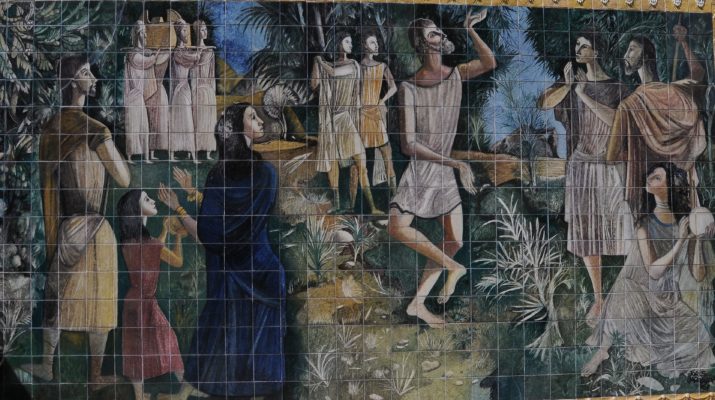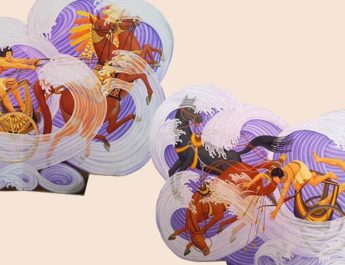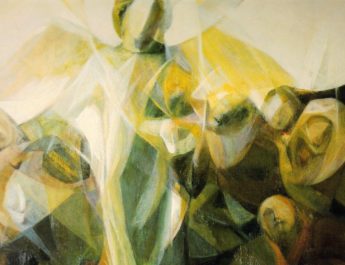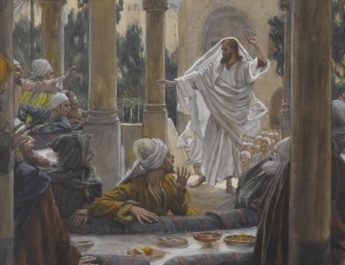Psalm 21
To the leader.A A PsalmB of David.C
A “leader” = natsach. Properly, something that glitters from a distance. So, something that stands out, excels, has status/standing (such as a chief musician or superintendent of Temple services). This can also mean to be permanent or enduring.
B “psalm” = mizmor. From zamar (making music; used specially of music to worship God; music with singing, singing praise, singing psalms); may be from zamar (to trim or prune). This is a melody or a psalm.
C “David” = david. From the same as dod (beloved, love, uncle); the root may mean to boil, which is used figuratively to describe love. So, this implies someone you love such as a friend, a lover, or a close family member like an uncle. David’s name likely means something like “beloved one.”
1 In your strengthD the king rejoices,E O Lord,F
and in your helpG how greatly he exults!H
D “strength” = oz. From azaz (to be strong, become fixed, be bold, prevail, be impudent; it means to be stout literally or figuratively. A Late Hebrew word). This is strength in the sense of force, majesty, praise, material and physical strength, the abstract notion of security. It can also speak of social or political power.
E “rejoices” = samach. This is to rejoice or be glad. Properly, it is to brighten up in a literal or figurative sense.
F “Lord” = YHVH. From havah (to be, become) or hayah (to come to pass, become, be). This is the name of the God of Israel, the self-existent and eternal one, the tetragrammaton. This pronunciation has been lost to time so “Lord” is generally used in its place.
G “help” = yeshuah. From yasha (to deliver, defend, help, preserve, rescue, be safe. Properly, to be open, wide or free, which implies being safe. Used causatively, it means to free). This is salvation, deliverance, health, victory, prosperity.
H “exults” = gil. Properly, this is twirling around because of a strong feeling whether of rejoicing or from fear. This can be rejoice, be glad or joyful, or to cry.
2 You have given him his heart’sI desire,J
and have notK withheldL the requestM of his lips. SelahN
I “heart’s” = leb. May be related to labab (to encourage; properly, to be encased as with fat; used in a good sense, this means to transport someone with love; used in a bad sense, it can mean to dull one’s senses). This is the heart, courage, one’s inner self, the mind, or the will. Heart is only used in a figurative sense in the Old and New Testaments.
J “desire” = taavah. From the same as avah (to desire, crave, wish for, lust after). This is what is desirable, a delight, greedy, satisfaction, a charm.
K “not” = bal. From balah (to grow old, wear out, consume, waste, enjoy, fail, decay). This is not, lest, neither. Properly, it refers to a failure, so it implies nothing or not at all.
L “withheld” = mana. This is to hold back, refuse, restrain, deny. It could be in a positive or in a negative sense.
M “request” = aresheth. 1x in OT. Perhaps from ‘aras (to engage, betroth). This is a desire, request, or longing. It may be a longing to possess.
N “selah” = selah. From salal (to lift up, build, pile, extol, exalt; can also be used for opposing as a dam holds back water). This is to lift up or exalt. Also, “selah” in the psalms where its precise meaning is uncertain. It could be a pause in the music, a moment of silence. It could signal a change in the service or mean something akin to amen.
3 For you meetO him with richP blessings;Q
you set a crownR of fine goldS on his head.
O “meet” = qadam. May be from qedem (front, formerly, before, east, eternal, everlasting, antiquity). This is to come in front or be in front and so meet, anticipate, confront, receive, or rise. It sometimes means to meet for help.
P “rich” = tob. From tob (to be pleasing, to be good). This is good, beautiful, pleasant, agreeable, bountiful, at ease. This word is used for goodness as a concept, a good thing, a good person. This can refer to prosperity and welfare as well as joy, kindness, sweetness, and graciousness. So, this is ethically good, but also enjoyably good.
Q “blessings” = barakah. From barak (to kneel, bless; blessing God as part of worship and adoration; blessing humans to help them; can be used as a euphemism to say curse God). This is blessing, which implies prosperity or peace.
R “crown” = atarah. From atar (to surround or encircle to defend, protect, or attack; to crown in a literal or figurative sense). This is a crown or wreath. Figuratively, it can mean honor.
S “fine gold” = paz. 9x in OT. From pazaz (being refined; gold as refined). This is refined or pure gold.
4 He askedT you for life;U you gave it to him—
lengthV of days foreverW and ever.X
T “asked” = shaal. This is to ask, inquire, beg, borrow, desire, request. It can also mean to demand.
U “life” = chay. From chayah (to live or keep alive literally or figuratively). This is alive, living, lifetime. It can also be used to describe someone’s age. It can refer to animals, plants, water, or a company or congregation of people. It is life in a very broad sense.
V “length” = orek. From arak (to be long in a literal or figurative sense, to continue, defer, draw out). This is length, long, or forever.
W “forever” = olam. This is a long scope of time whether in the past (antiquity, ancient time) or in the future (eternal, everlasting).
X “ever” = ad. From adah (to advance or continue; to take away or remove; adorning oneself with ornaments). This is old, perpetuity, eternity. It is a duration going back or forward.
5 His gloryY is greatZ through your help;
splendorAA and majestyBB you bestowCC on him.
Y “glory” = kabod. From kabad (to be heavy, weighty, burdensome). This is weighty. Figuratively, glorious, abundant, riches, honor, splendor – a reference to one’s reputation or character. This word is often used to describe God and God’s presence.
Z “great” = gadol. From gadal (to grow up, become great, become wealthy – to advance. The root meaning may be to twist in the sense of the process of growing). This is great, high, bigger, noble, old, marvelous. It can also refer to someone who is powerful or distinguished.
AA “splendor” = hod. This is grandeur, beauty, glory, honor, or authority. It emphasizes a form or appearance with gravitas.
BB “majesty” = hadar. From hadar (to honor or adorn; majestic, respected, glorious; to favor or honor; to be proud). This is ornament, splendor, beauty, dignity, majesty, magnificence, and glory.
CC “bestow” = shavah. This is to equalize, resemble, agree with, compare, adjust, compose, place, or yield.
6 You bestowDD on him blessings forever;
you make him gladEE with the joyFF of your presence.GG
DD “bestow” = shith. This is to place, set, bring, appoint, consider, bring, array or look.
EE “make…glad” = chadah. 3x in OT. This is to rejoice, be glad, or join. It can also mean to be sharp.
FF “joy” = simchah. Related to “rejoices” in v1. From samach (see note E above). This is joy, rejoicing, pleasure, or glee.
GG “presence” = paneh. From panah (to turn, face, appear). This is face in a literal or figurative sense. It could be face, presence, anger, respect. It can also be used of God to indicate divine favor or presence.
7 For the king trustsHH in the Lord,
and through the steadfast loveII of the Most HighJJ he shall not be moved.KK
HH “trusts” = batach. This is to hide for refuge, be secure or sure. Figuratively, it refers to trust, being confident, or hoping.
II “steadfast love” = chesed. From chasad (being good, kind, merciful; may mean bowing one’s neck as is done in the presence of an equal for courtesy’s sake; so, if one in a superior position is treating you like an equal, that is what is captured here). This is favor, goodness, kindness, loving kindness, pity, reproach, or a good deed. When done by God to humanity, this is mercy/loving kindness. When done by humanity to God, it is piety.
JJ “Most High” = elyon. From alah (to go up, ascend, be high, be a priority; to arise in a literal or figurative sense). This is most high, upper. It refers to elevation – so, lofty.
KK “be moved” = mot. This is to shake, slip, falter, stagger, move, fall, give way, waver, be carried.
8 Your handLL will findMM out all your enemies;NN
your right handOO will find out those who hatePP you.
LL “hand” = yad. This is hand, ability, power. Hand in a literal sense, but also what one can do or the means by which one does it.
MM “find” = matsa. This is to find, catch or acquire. It can also mean to come forth or appear. Figuratively, this can mean to meet or be together with.
NN “enemies” = oyeb. From ayab (to hate or be hostile to). This is a foe or enemy as one that you are hostile to.
OO “right hand” = yamin. May be from yamam (to go or choose the right, use the right hand; to be physically fit or firm). This can mean right hand, right side, or south. Since most people are right-handed, the metaphorical usage of this word presumes that the right hand is stronger and more agile. Thus, it is the instrument of power and action.
PP “hate” = sane. This is an enemy or foe. It is one that is hated with a personal hatred.
9 You will makeQQ them like a fiery furnaceRR
whenSS you appear.TT
QQ “make” = shith. Same as “bestow” in v6. See note DD above.
RR “furnace” = tannur. 15x in OT. From the same as tenuk (ear lobe, pinnacle, extremity); perhaps from the same as anak (plumb line, hook; root may mean to be narrow) OR from ner (properly, to glisten; a lamp, light, burner, candle; light literal or figurative). This is a portable stove, oven, or furnace.
SS “when” = eth. Probably from anah (to answer, sing, announce); from ad (forever, all, old); from adah (to pass on, advance, decorate oneself). This is a period or season. It can also mean whenever or continually.
TT “appear” = paneh. Same as “presence” in v6. See note GG above.
The Lord will swallow them upUU in his wrath,VV
and fire will consumeWW them.
UU “swallow…up” = bala. This is to swallow, engulf, cover, or destroy.
VV “wrath” = aph. From anaph (to be angry; properly, breathing hard as a signifier of being enraged). This properly refers to the nose or nostril and by extension the face. It can specifically refer to anger or wrath as one breathes hard and nostrils flare in times of great anger.
WW “consume” = akal. This is to eat, devour, burn up, or otherwise consume. It can be eating in a literal or figurative sense.
10 You will destroyXX their offspringYY from the earth,
and their childrenZZ from among humankind.AAA
XX “destroy” = abad. To wander off, lose self. This implies to perish, destroy, die, vanish, or be broken or corrupt.
YY “offspring” = peri. From parah (to bear fruit, grow, be fruitful, increase; bearing fruit in a literal or figurative sense). This is fruit or reward.
ZZ “children” = zera. From zara (to sow or scatter seed; conceive or yield). This is seed or sowing. It can, thus, mean a fruit, plant, sowing time, child, offspring, or posterity.
AAA “humankind” = ben + adam. Literally “sons of humanity.” Adam is perhaps from adam (to be red, make ruddy); related to adamah (ground, dirt, earth). This is man, humankind, also Adam’s name. It refers to a human individual or humanity.
11 If they planBBB evilCCC against you,
if they deviseDDD mischief,EEE they will notFFF succeed.GGG
BBB “plan” = natah. This is to stretch or spread out, to extend, or bend. In can also imply moral deflection.
CCC “evil” = ra’. From ra’a’ (to be evil, bad, afflict; properly, to spoil – to destroy by breaking into pieces; figuratively, to cause something to be worthless; this is bad in a physical, social, or moral sense; that which displeases, to do harm or mischief, to punish or vex). This is bad, disagreeable, that which causes pain, misery, something having little or no value, something that is ethically bad, wicked, injury, calamity. This refers to anything that is not what it ought to be – a natural disaster, a disfigurement, an injury, a sin.
DDD “devise” = chashab. This is properly to braid or interpenetrate. Literally it is to create or to wear. Figuratively, it can mean plotting – generally in a negative sense. More broadly, this can also mean think, consider, or make account of.
EEE “mischief” = mezimmah. 19x in OT. From zamam (to devise, plot, imagine, intend, scheme, think evil; usually in an evil sense). This is generally an evil plan like a machination. It could also refer to goodness, wisdom.
FFF “not” = bal. Same as “not” in v2. See note K above.
GGG “succeed” = yakol. This is to be able, endure, overcome, prevail.
12 For you will put them to flight;HHH
you will aimIII at their facesJJJ with your bows.KKK
HHH “put…to flight” = shith + shekem. Literally “make them turn their back.” Shith is the same as “bestow” in v6. See note DD above. Shekem is perhaps from shakam (to rise early, begin work early; properly, this is leaning one’s shoulder or back into a load or a burden; also, loading an animal for work). This is shoulder, neck, or some other place that bears burdens. Figuratively, it can refer to the spur of a hill, or one’s allotted portion.
III “aim” = kun. Properly, this means in a perpendicular position. So, it is set up in a literal sense – establish, fix, fasten, prepare. In a figurative sense, it is certainty, to be firm, faithfulness, render sure or prosperous.
JJJ “faces” = paneh. Same as “presence” in v6. See note GG above.
KKK “bows” = methar. 9x in OT. From yathar (to jut over, remain behind, preserve, to excel). This is a cord as part of a tent or a string belonging to a bow.
13 Be exalted,LLL O Lord, in your strength!
We will sing and praiseMMM your power.NNN
LLL “be exalted” = rum. This is to rise or raise, to be high literally or figuratively. So it can also mean to exalt or extol.
MMM “praise” = zamar. Related to “psalm” in superscript verse. See note B above.
NNN “power” = geburah. From gabar (to be strong or mighty; to prevail or be insolent). This is force in a literal or figurative sense. So, it could be strength, power, courage, triumph, victory, or mastery.
Image credit: Azulejo at the Nogueira da Silva Museum in Braga, Portugal depicting “The biblical scene of King David dancing in front of the Ark of the Covenant.




